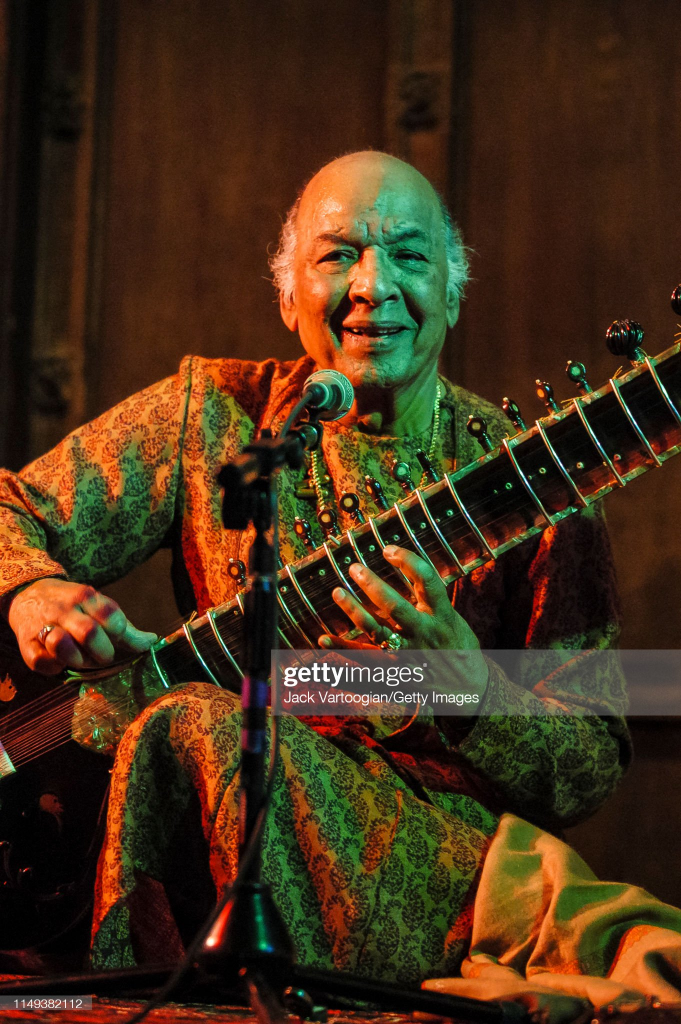Ustad Vilayat Khan (28 August 1928 – 13 March 2004) was an Indian classical Sitar player. Along with Imdad Khan, Enayat Khan, and Imrat Khan, he is credited with the creation and development of Gayaki Ang (an attempt to mimic the sound of the human voice) on the sitar.

He recorded his first 78-RPM disc at the age of 6 and gave his last concert in 2004 at the age of 75. He has composed the music for several films, including Jalsaghar (1958), The Guru (1969), and Kadambari (1976). He had given a chance to newcomer Kavita Krishnamurthy in Kadambari which was the first song in her career.

Early Life
Vilayat was born in Gouripur, Mymensingh in then East Bengal in British India and current Bangladesh.
His father Enayat Khan was recognised as a leading sitar and Surbahar (bass sitar) player of his time, as had been his grandfather, Imdad Khan, before him.
He was taught in the family style, known as the Imdadkhani gharana by his father and other relatives in the family. Imdadkhani gharana is also called Etawah gharana known after a small city close to Agra where Imdad Khan lived.

This family represents the sixth generation of musicians that dates back to the Mughal Empire.
However, Enayat Khan died when Vilayat was only ten, so much of his education came from the rest of his family: his uncle, sitar and surbahar maestro Wahid Khan, his maternal grandfather, singer Bande Hassan Khan, and his mother, Bashiran Begum, who had studied the practice procedure of his forefathers.
His uncle, Zinde Hassan, looked after his Riyaz (practice). As a boy, Vilayat wanted to be a singer; but his mother, herself from a family of vocalists, felt he had a strong responsibility to bear the family torch as a sitar maestro.
Performing career
Vilayat Khan performed at All Bengal Music Conference, as his first concert, organized by Bhupen Ghosh in Kolkata with Ahmed Jan Thirakwa on tabla.

His performance at the concert organized by Vikramaditya Sangeet Parishad, Mumbai in 1944 drew the headline “Electrifying Sitar”. In the 1950s, Vilayat Khan worked closely with instrument makers, especially the famous sitar-makers Kanailal & Hiren Roy, to further develop the instrument.
Also, he liked to perform without a Tanpura drone, filling out the silence with strokes to his Chikari strings.
Some ragas he would somewhat re-interpret (Bhankar, Jaijaivanti), others he invented himself (Enayatkhani Kanada, Sanjh Saravali, Kalavanti, Mand Bhairav).
But he was first and foremost a traditional interpreter of grand, basic ragas such as Yaman, Shree, Todi, Darbari and Bhairavi. He was known for improvisation with his knack for finding the different patterns in the ragas he played.[1]
Vilayat Khan was both a traditional sitar player and a maverick innovator in his music. He was given a lot of credit for developing a sitar style called ‘gayaki ang’, where his sitar attempted to mimic the sound of the human voice and seemed to give the audience a sense that the sitar was singing.
He invented a technique of bending a note after the sitar string was plucked, creating a sound after-effect from it. This technique later influenced other sitar players.
When he died from lung cancer in 2004, Vilayat Khan had been recording for over 65 years and broadcasting on All India Radio almost as long.
He had been touring outside India off and on for more than 50 years and was probably the first Indian musician to play in England after independence (1951).
In the 1990s, his recording career reached a climax of sorts with a series of ambitious CDs for India Archive Music in New York, some traditional, some controversial, some eccentric.
During his long career, he toured and performed in South Asia, China, Africa, Europe and the former Soviet Union.
Vilayat composed and conducted the score for three feature films – Satyajit Ray’s Jalsaghar (1958) in Bengali, Merchant-Ivory Productions’ The Guru (1969) in English, and Madhusudan Kumar’s Kadambari (1976) in Hindi.
He also composed the music for a little-known documentary film in Bengali produced by Dr Barin Roy, entitled Jalsaghar; he won a silver medal for composing at the 1st Moscow International Film Festival.
Death and legacy
Vilayat Khan died on 13 March 2004 at Mumbai, India at age 75. The Press Trust of India reported that Vilayat Khan had lung cancer, diabetes and hypertension.
NDTV (New Delhi Television) reportedly quoted the prime minister of India, Atal Bihari Vajpayee, saying this in a statement, “Ustad Vilayat Khan was a child prodigy to whom goes the credit of taking the sitar beyond the shores of this country.”
A few YouTube Videos of Ustad Vilayat Khan
